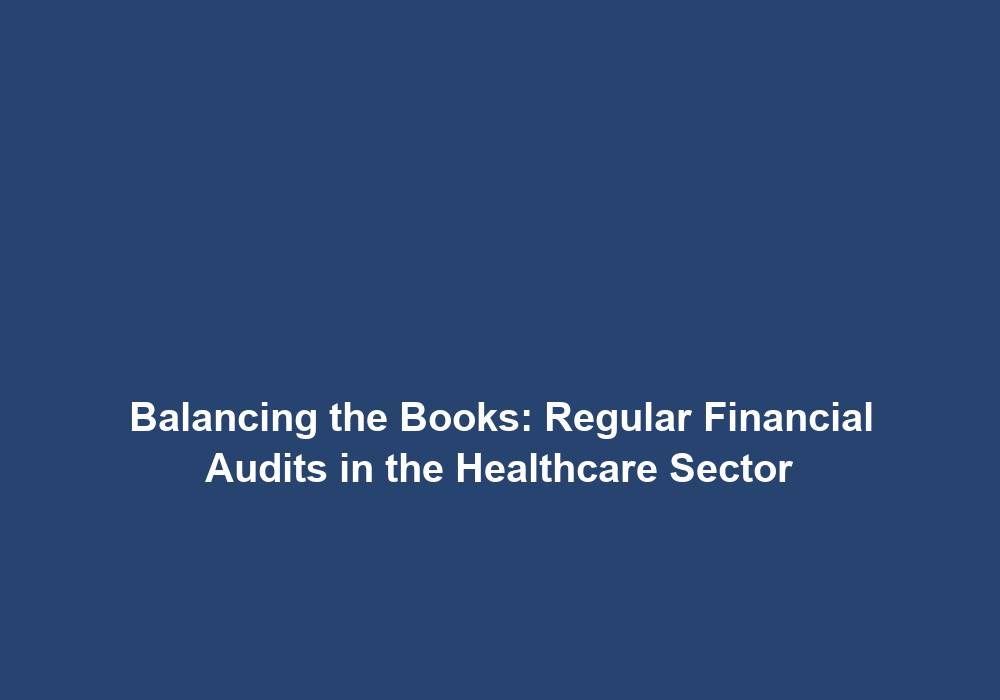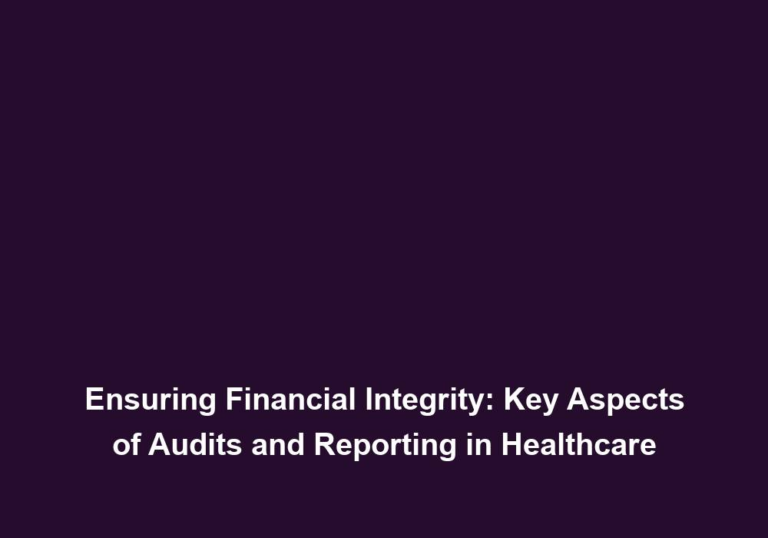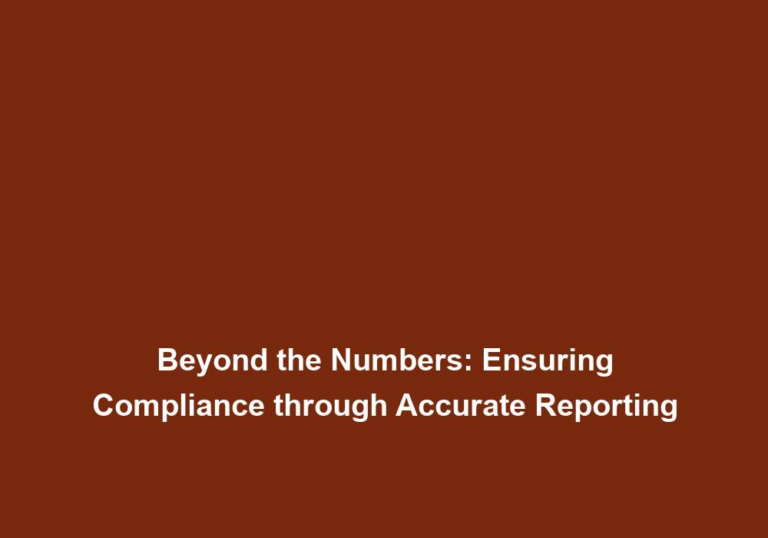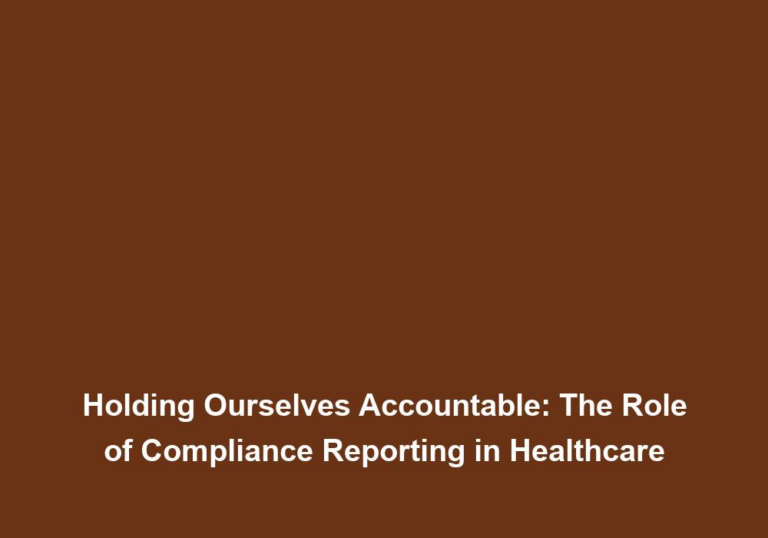Balancing the Books: Regular Financial Audits in the Healthcare Sector
In the ever-evolving healthcare sector, financial management plays a critical role in ensuring sustainable operations and the provision of quality care. To maintain financial stability, healthcare organizations must engage in regular financial audits. These audits serve as a crucial tool for reviewing and evaluating financial records, identifying potential risks, and ultimately ensuring the accuracy and reliability of financial statements. This article explores the importance of regular financial audits in the healthcare sector and provides an in-depth understanding of their benefits and implementation.
The Significance of Regular Financial Audits
Financial audits serve as a mechanism to assess the financial health of healthcare organizations. By conducting regular audits, healthcare providers can identify areas of improvement, rectify discrepancies, and enhance financial stewardship. Let’s delve into the key reasons why regular financial audits are imperative:
1. Ensuring Compliance
Compliance with regulatory standards is paramount in the healthcare sector. Regular financial audits help organizations adhere to the numerous regulations imposed by governing bodies, such as the Health Insurance Portability and Accountability Act (HIPAA). Through comprehensive audits, healthcare providers can identify any potential non-compliance issues, rectify them, and avoid costly penalties.
In order to ensure compliance, auditors carefully review financial records, policies, and procedures to assess whether the organization is meeting the required standards. They also evaluate the effectiveness of internal controls in place to prevent fraud and ensure data security. By identifying any areas of non-compliance, healthcare organizations can take corrective actions and implement necessary changes to mitigate risks and maintain regulatory compliance.
2. Identifying Fraud and Mismanagement
Unfortunately, healthcare organizations are not immune to fraud and mismanagement. Regular financial audits act as a powerful deterrent against fraudulent activities by detecting any irregularities in financial records or transactions. By routinely reviewing financial data, auditors can identify suspicious activities, investigate them thoroughly, and take necessary actions to mitigate risks and protect the organization’s assets.
Auditors use various techniques and tools to detect fraud, such as data analysis, trend analysis, and internal control testing. They carefully examine financial transactions, invoices, and payment records to identify any discrepancies or inconsistencies. If fraudulent activities are identified, auditors work closely with management to implement corrective measures, strengthen internal controls, and prevent future occurrences.
3. Enhancing Financial Decision-Making
Accurate and reliable financial information is crucial for making informed decisions. Regular financial audits provide healthcare organizations with a clear picture of their financial position, enabling leaders to identify strengths, weaknesses, and areas requiring improvement. This valuable insight facilitates effective financial planning, budgeting, and resource allocation, ultimately leading to enhanced decision-making and strategic management.
During financial audits, auditors analyze financial statements, cash flows, and key financial ratios to evaluate the organization’s financial performance. They also assess the efficiency of financial processes and systems in place. By identifying areas of improvement and providing recommendations, auditors enable healthcare organizations to optimize their financial operations, allocate resources effectively, and achieve their strategic goals.
4. Assessing Revenue Cycle Efficiency
A well-functioning revenue cycle is vital for the financial sustainability of healthcare organizations. Regular financial audits evaluate revenue cycle processes and identify potential bottlenecks or inefficiencies. By analyzing billing, coding, and reimbursement procedures, auditors can improve revenue cycle management, optimize revenue collections, and minimize claim denials, ultimately boosting the organization’s financial performance.
Auditors review the entire revenue cycle, from patient registration to claim submission and payment posting. They assess the accuracy and completeness of coding, billing, and documentation processes. By identifying any weaknesses or inefficiencies, auditors can recommend process improvements, staff training, and technology enhancements to streamline the revenue cycle and maximize revenue generation.
5. Safeguarding Stakeholder Trust
In the healthcare sector, maintaining trust is paramount. Regular financial audits provide reassurance to stakeholders, including patients, investors, and regulatory bodies, that the organization is committed to transparency and financial integrity. By demonstrating a strong control environment and adherence to accounting principles, healthcare providers can establish credibility and earn the trust of their stakeholders.
Auditors play a crucial role in building stakeholder trust by independently verifying the accuracy and reliability of financial information. They provide assurance that the organization’s financial statements present a true and fair view of its financial position. By highlighting any issues or risks identified during the audit process, auditors enable healthcare organizations to address concerns promptly, strengthen governance practices, and maintain stakeholder confidence.
The Process of Conducting Regular Financial Audits
To ensure the effectiveness and efficiency of financial audits, healthcare organizations must follow a well-defined process. Here are the key steps involved in conducting regular financial audits:
1. Planning
The planning phase sets the foundation for a successful financial audit. During this stage, the audit objectives, scope, and timeline are determined. The audit team identifies key areas to focus on, such as revenue, expenses, accounts payable, and accounts receivable. By aligning audit activities with the organization’s strategic goals and objectives, auditors can maximize the value of the audit.
In the planning phase, auditors gather information about the organization’s financial processes, systems, and controls. They assess the risks associated with financial operations and develop an audit plan accordingly. The plan includes specific procedures to be performed, resources required, and timelines for completion. A well-planned audit ensures that all relevant areas are covered and that the audit objectives are achieved effectively and efficiently.
2. Gathering Information
In this phase, auditors collect relevant financial data, including financial statements, general ledgers, invoices, bank statements, and payroll records. The information gathering process is crucial for auditors to gain a comprehensive understanding of the organization’s financial activities and ensure the accuracy and completeness of the audit.
Auditors obtain financial documents and records from various sources within the organization. They review these documents to verify the accuracy of financial information and identify any potential discrepancies. Auditors also interview key personnel involved in financial operations to gain insights into the organization’s financial processes and controls. This comprehensive data collection process forms the basis for further analysis and evaluation during the audit.
3. Conducting Fieldwork
Fieldwork involves analyzing the gathered financial data and performing detailed testing procedures. Auditors closely examine financial transactions, verify the accuracy of recorded amounts, and assess the organization’s internal control systems. By conducting detailed fieldwork, auditors can identify any non-compliance issues, irregularities, or control weaknesses that require attention.
During fieldwork, auditors perform substantive testing to verify the accuracy and completeness of financial records. They also assess the effectiveness of internal controls in place to prevent errors, fraud, and non-compliance. Auditors may use sampling techniques to select a representative sample of transactions for testing. The findings from fieldwork provide valuable insights into the organization’s financial health and serve as the basis for the audit report.
4. Reporting and Communication
Following the fieldwork, auditors prepare a comprehensive audit report. This report summarizes the audit findings, provides recommendations for improvement, and highlights any significant issues or risks identified during the audit process. Clear and concise communication of audit results is essential to ensure that management and relevant stakeholders understand the findings and take appropriate actions.
The audit report includes a summary of the audit scope, objectives, and methodology. It presents the audit findings in a structured manner, highlighting any areas of concern or improvement opportunities. Auditors provide specific recommendations to address identified issues and enhance the organization’s financial management practices. The report is typically shared with management, the board of directors, and other relevant stakeholders to facilitate decision-making and drive positive change.
5. Monitoring and Follow-up
Regular financial audits should not be viewed as a one-time event. Healthcare organizations must establish a system for monitoring audit recommendations, tracking progress, and implementing corrective actions. By following up on audit findings, organizations can ensure continuous improvement, mitigate risks, and maintain financial integrity over time.
Management plays a crucial role in monitoring and implementing audit recommendations. They establish tracking mechanisms to monitor the progress of corrective actions and ensure their timely completion. Regular follow-up meetings and reporting enable management to address any challenges or roadblocks encountered during the implementation process. By monitoring and following up on audit recommendations, healthcare organizations demonstrate their commitment to ongoing improvement and accountability.
Conclusion
In conclusion, regular financial audits are essential for the healthcare sector to maintain financial stability, compliance, and transparency. By systematically reviewing financial records, healthcare organizations can identify and rectify potential issues, safeguard stakeholder trust, and make informed financial decisions. Implementing a robust audit process, from planning to monitoring, is crucial for achieving the desired outcomes and ensuring the long-term financial health of healthcare organizations.







